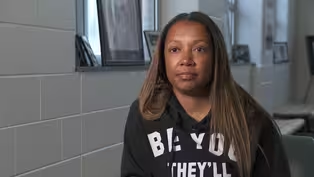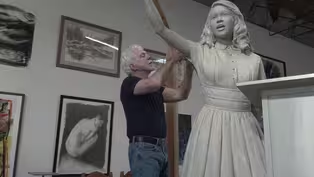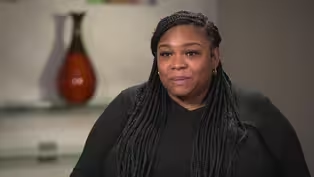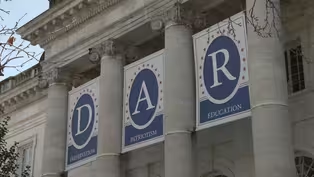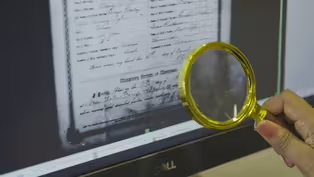VPM News Focal Point
Exploring what it means to be Melungeon
Clip: Season 3 Episode 5 | 6m 57sVideo has Closed Captions
Melungeons are an ethnic group of mixed ancestry with roots in Appalachia.
The Melungeon Heritage Association met in Hillsborough, NC recently to discuss an upcoming conference exploring their identity. Andrew Harris Jr was an attendee.
Problems playing video? | Closed Captioning Feedback
Problems playing video? | Closed Captioning Feedback
VPM News Focal Point is a local public television program presented by VPM
The Estate of Mrs. Ann Lee Saunders Brown
VPM News Focal Point
Exploring what it means to be Melungeon
Clip: Season 3 Episode 5 | 6m 57sVideo has Closed Captions
The Melungeon Heritage Association met in Hillsborough, NC recently to discuss an upcoming conference exploring their identity. Andrew Harris Jr was an attendee.
Problems playing video? | Closed Captioning Feedback
How to Watch VPM News Focal Point
VPM News Focal Point is available to stream on pbs.org and the free PBS App, available on iPhone, Apple TV, Android TV, Android smartphones, Amazon Fire TV, Amazon Fire Tablet, Roku, Samsung Smart TV, and Vizio.
Providing Support for PBS.org
Learn Moreabout PBS online sponsorshipANGIE MILES: What does it mean to be Melungeon?
In the mountains of Virginia and other Appalachian states, mixed race people have long eked out a living while questions about their intriguing origins have persisted.
Multimedia Reporter Billy Shields caught up with members of the Melungeon Heritage Association during a recent meeting.
BILLY SHIELDS: One person's identity at one moment in history might be a different identity in a separate moment.
The way you were raised and the things that you were told about your own background, how did all of that play out in your own life?
You might hear the term Melungeon, and what would that mean to you?
ANDREW HARRIS JR.: I never heard that term other than my dad would talk about Ma Sally, as he would always say, is my great great-grandmother.
And hed kind of give me this story of she was an Indian or Native American, and he would always describe her as having this real, real long hair that came down almost to her waist in the back.
And he just always described that, but didn't go into detail.
He just, that was it.
It was like pulling teeth, hens teeth from him, try to pull this information out.
It was interesting.
But still, I didn't know a lot.
But I think my dad was interacting with the cousins that he grew up with and knew and visited with.
And it was just something that I don't think he even realized that that was a missing link for me.
And actually, some of 'em I worked with and didn't know I was related to 'em.
BILLY SHIELDS: Do you think it's a situation where there were things that maybe your dad didn't want to talk to you about?
Perhaps this was a more complicated narrative than he wanted to go into?
ANDREW HARRIS JR.: My dad really didn't...
I think he was more protecting me from a lot of the things and things that were going on during that time in North Carolina and also in Virginia.
Just coming from the north to the south.
We always traveled early in the morning.
I didn't know why.
'Course, car's got New York plates on it.
He'd want to gas up in Washington DC first and then make it all the way in.
I said, 'Why don't you... " "Oh no, I want to get gas here."
Not knowing that segregation and all those things were taking place at the time.
BILLY SHIELDS: Yeah.
ANDREW HARRIS JR.: So he and my mom both protected, you know, the two young kids.
BILLY SHIELDS: One of the things that you sometimes hear in among the Melungeon community, some people would say that they're Portuguese sailors that ended up in the mountains, or Turkish sailors, that kind of thing.
With the advent of genetic testing, has that changed the identity that's been passed down to you from your family at all?
Or is this just, you've done the homework already?
ANDREW HARRIS JR.: I'm still seeking information.
Finding out about this, it was just like overwhelming for me, it was just a lot.
My cousin Beverly introduced me to a lot of the history and a lot of information and I've been reading and talking to people and the like and just to hear about the Melungeons or the Maroon community, so to speak.
I pay attention to people, especially in Virginia when I go to the western part of Virginia or even other areas in North Carolina, looking at the bone structure of people, looking at their faces, the eyes and all.
I say, 'Oh, look at the cheeks,' you know, and I'm looking at all these things and sometimes I have actually run into somebody that is actually Native American 'cause I see a T-shirt that they may have, but they're not as dark complexion as I am.
And I asked him, you know, just strike up a conversation and then here we go with, yeah, you know, this is my heritage.
But you can see either the European or the African or the Native American mixture in these individuals.
And I pay attention to that now.
BILLY SHIELDS: Different ethnic groups will have a very... a sort of a cultural identity.
ANDREW HARRIS JR.: Mm-hmm.
BILLY SHIELDS: How would you characterize the Melungeon cultural identity?
ANDREW HARRIS JR.: I think it's becoming more prevalent.
It's, people are talking more about the community as a whole.
They're accepting it more.
And with, of course the internet and Google, people are starting to actually receive actually the truth about what really occurred.
That history was purposely strategically suppressed for certain reasons.
And the theory, if you had just an ounce or less of either Native American blood or African blood, then they pick and choose.
If you were brown skinned like me, you say, "Well, you know, he's Black."
They put me in that category.
But you know, we're all kind of mixed up in that.
But the community at large, it's starting to grow, it's starting to expand.
The truth is coming out and I think it's really getting to the point where people are really curious.
They want to know.
But also, once they find out the truth about this particular community and how the tri-racial community is actually all over the United States and actually all parts of the world, it's like, "Hey, you know, let's accept it."
It is what it is.
We can't turn back the clock, so to speak.
BILLY SHIELDS: As far as your own ancestry goes and where various groups came from in your own background, did you ever go back and say, "Oh, okay, they came in through this area, or they migrated here?"
In your situation, what did that look like?
ANDREW HARRIS JR.: I hunt a lot and I stay in the woods.
But, why do I stay in the woods?
And my dad even said to me, he said, "You know, you've got that.
You got it honest."
What do you mean, 'You got it honest?'
"Well, you know, your great great-grandfather did it and, you know, and your great great-grandmother, you know, she was Native American, and Ma Sally."
He said, "So it's in you."
That's how I view it and that's how I'm looking at now.
Even today at 70 years old, you know, (laughs) I'm trying to play catch up on who I am.
Video has Closed Captions
Clip: S3 Ep5 | 10m 52s | Deone Allen calls for the School Board to take action to remedy children being mistreated. (10m 52s)
Civil Rights Figure Gets a Step Closer to the U.S. Capitol
Video has Closed Captions
Clip: S3 Ep5 | 2m 12s | Teenage civil rights figure is one step closer to her place in the U.S. Capitol. (2m 12s)
Combatting Black maternal health disparities
Video has Closed Captions
Clip: S3 Ep5 | 4m 27s | Doctors at Eastern Virginia Medical School focus on improving Black maternal health care. (4m 27s)
Diversity is top priority for new DAR leadership
Video has Closed Captions
Clip: S3 Ep5 | 3m 19s | DAR makes diversity a top priority as chapters welcome descendants of “Forgotten Patriots. (3m 19s)
Video has Closed Captions
Clip: S3 Ep5 | 7m 30s | With the help of at-home DNA tests, many are discovering stories hidden in their ancestry. (7m 30s)
Providing Support for PBS.org
Learn Moreabout PBS online sponsorship
- News and Public Affairs

Top journalists deliver compelling original analysis of the hour's headlines.

- News and Public Affairs

FRONTLINE is investigative journalism that questions, explains and changes our world.












Support for PBS provided by:
VPM News Focal Point is a local public television program presented by VPM
The Estate of Mrs. Ann Lee Saunders Brown
